How Vishwa Samudra Group is riding the infra wave
Vishwa Samudra Group is taking advantage of government infrastructure projects, and delivering tech-centric and quality-centric solutions
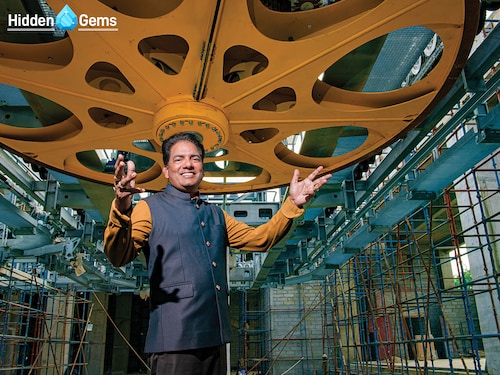

Anil Yendluri believes it’s all the grace of Lord Guruvayurappan, a form of Lord Vishnu, worshipped and revered in the southern state of Kerala.
Although, a non-Keralite by birth, it had been in Kerala that Yendluri spent a considerable amount of his professional life, rising through the ranks of the Indian Police Service (IPS) to become an inspector general (IG), the third highest position in the police service. Yendluri joined the IPS in 1988. “I know Kerala inside out," he says. “That means, I know how the people think and how work needs to be done there."
In 2009, Yendluri took voluntary retirement from the IPS to join Krishnapatnam Port, a greenfield project being developed by the Hyderabad-based Navayuga Group in Andhra Pradesh, as its managing director. “It’s not easy to develop a port in India," Yendluri says. “But, to build a greenfield port, make it world-class, and finally get the kind of value in a short time shows the strong mental strength that we had."
In 2020, the Adani Group bought a 75 percent stake in Krishnapatnam Port for Rs12,000 crore, before purchasing the remaining stake for Rs2,800 crore in 2021. The remaining 25 percent in the port was held by Vishwa Samudra Group, founded by C Sasidhar, who had served as the port’s managing director. His family owned Navayuga Group, and Sasidhar had ventured out alongside the family business, which included his father and brother, to set up the Vishwa Samudra Group in 2016.
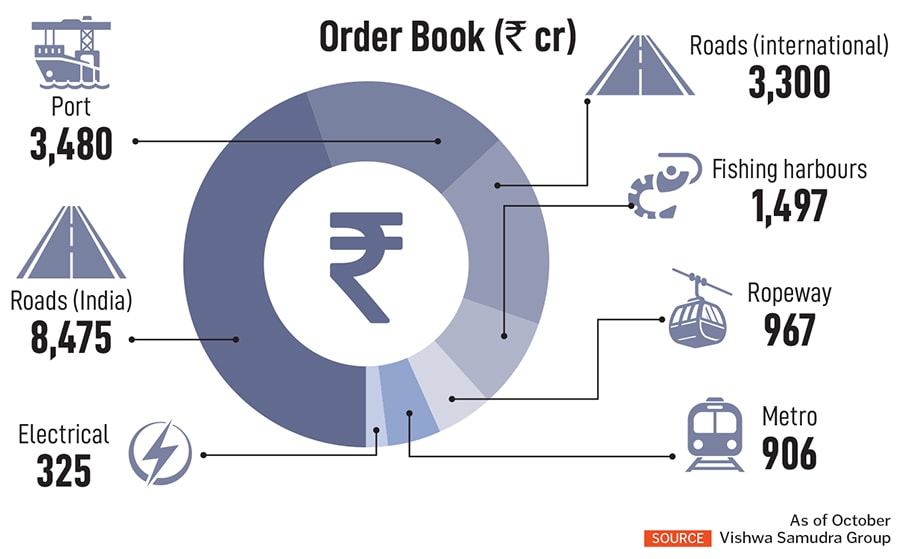
The sale, which was among the biggest port deals in India, saw the Adani Group scale up its presence on the eastern coast of the country, and in many ways, also laid the foundations of what would eventually become Vishwa Samudra Engineering, the flagship company of the Vishwa Samudra Group. That arm, originally founded in 2016, had largely focussed on the port side activities and infrastructure of Krishnapatnam Port until then.
“But, infrastructure sector, especially roads, was a massive opportunity both in India and abroad," says C Sasidhar, chairman of Vishwa Samudra Group. “If you look at the US, the country is famous for its roads. India has some tremendous opportunities in the road and infrastructure space."
That meant, in early 2021, after the deal with the Adanis was complete, Sasidhar and Yendluri turned all their attention to highways, which is when Kerala came back into the picture for Yendluri. “When others were shying away from Kerala, we got our first project in developing the highways there," he says. “It was not a small project and was worth Rs2,100 crore." Over the next few months, the company bagged two more highway projects in Kerala, as part of the state’s massive road expansion plans. Today, the Vishwa Samudra Group is building key stretches of the 582 km of highways in Kerala, a state that was once notorious for lack of land availability for road expansion, which had crippled its highway infrastructure.
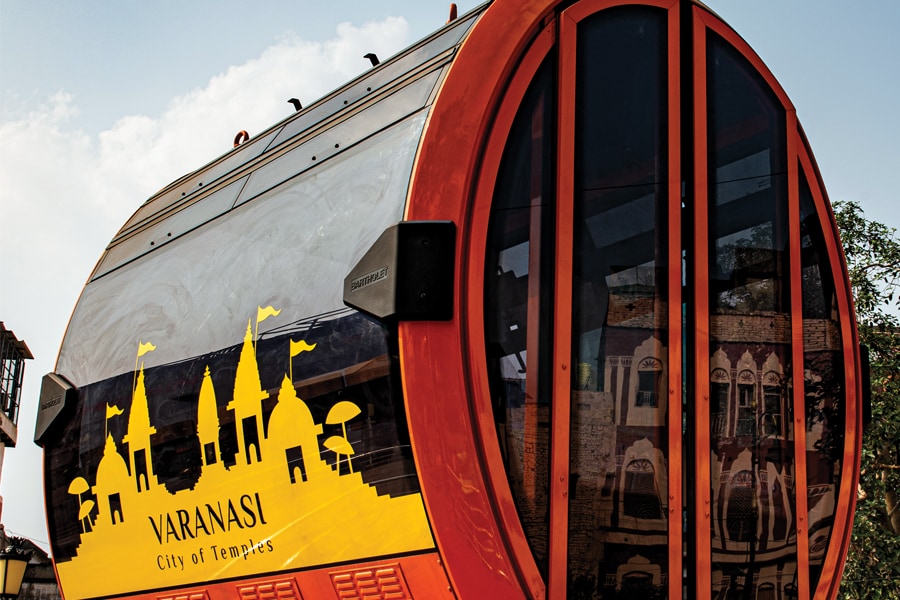 The group is engaged in building India’s first urban ropeway project in Varanasi
The group is engaged in building India’s first urban ropeway project in Varanasi
Since then, the group has managed to scale up significantly and boasts an order book in excess of Rs19,000 crore, of which over 60 percent is in the highway sector. The Vishwa Samudra Group comprises 15 divisions and is headquartered in Hyderabad. Apart from engineering and infrastructure, its other businesses include construction, shipping services, port and maritime services, real estate and logistics.
In FY24, Vishwa Samudra Engineering, which accounts for over 95 percent of the group’s revenues, earned Rs3,180 crore. By FY27, it is looking at revenues of Rs12,000 crore, which could go up to Rs30,000 crore by FY30
The group is engaged in building India’s first urban ropeway project in Varanasi, which is among the pet projects of Prime Minister Narendra Modi. Vishwa Samudra won the bid when tenders were floated in 2021, in partnership with Switzerland-based Bartholet Maschinenbau AG.
That project spans 3.85 km, with a passenger capacity of 96,000 per day. In all, the government has identified 200 such projects for Rs1.25 lakh crore over the next five years under the National Ropeways Development Programme, or the Parvatmala Pariyojana. The project offers significant opportunities for the likes of Vishwa Samudra Group, which has an early mover advantage in the niche segment.
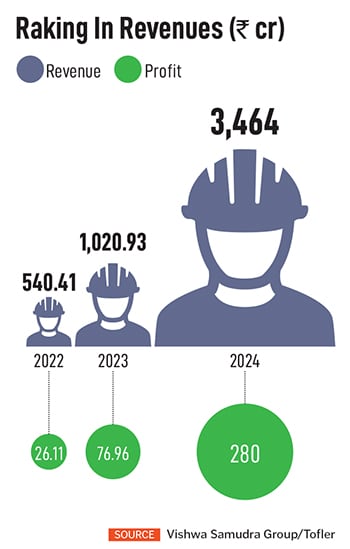 The group is also undertaking significant road projects across the country. These include the development of National Highway (NH) 244A in Jammu, two different stretches of NH47 in Kerala, and NH17 in Kerala. Together, the four highway projects account for Rs6,640 crore. The company is also building rural roads in Andhra Pradesh and Uttar Pradesh.
The group is also undertaking significant road projects across the country. These include the development of National Highway (NH) 244A in Jammu, two different stretches of NH47 in Kerala, and NH17 in Kerala. Together, the four highway projects account for Rs6,640 crore. The company is also building rural roads in Andhra Pradesh and Uttar Pradesh.
“We feel we are slow even though it looks very fast for others," adds Sasidhar. “We can achieve more with our strength because the talent that the group is sitting on is extremely strong." Sasidhar had built a reputation for executing the Krishnapatnam Port in 18 months. In addition, Vishwa Samudra Group has grabbed a project in Guyana, in South America, for the construction of a highway worth $412 million.
For all this, the company is banking on what it calls Stabilroad, a technology developed in Germany that processes existing soils with cement and special additives, making the soil resistant to compressive strength as well as elastic, waterproof, and frost resistant. Stabilroad also claims to be greener, with significantly less pollution, and lower labour and fuel costs.
“When we started, we saw that the market has a few big players and many small players, but without many good quality players," adds Yendluri. “Because they were all old-generation construction companies with old methodologies and old mindsets and old value systems, we realised we needed a new mindset, new technologies, and new value systems. We wanted to create a new generation construction company that is tech-centric, quality-centric, cost-centric and at the end of the day, not just making money or completing the projects but creating value."
India’s highway sector has been in the midst of a transformation over the past decade, largely due to the Modi government’s focus on the sector, with over 50,000 km added in the last decade, since he has been in power. The trend is expected to continue, even though the sector has seen some plateauing in recent times. In 2024, rating agency ICRA revised its forecast of road awards by the Ministry of Road Transport and Highways to 8,500 km to 9,000 km, similar to last year’s awarding of 8,581 km. 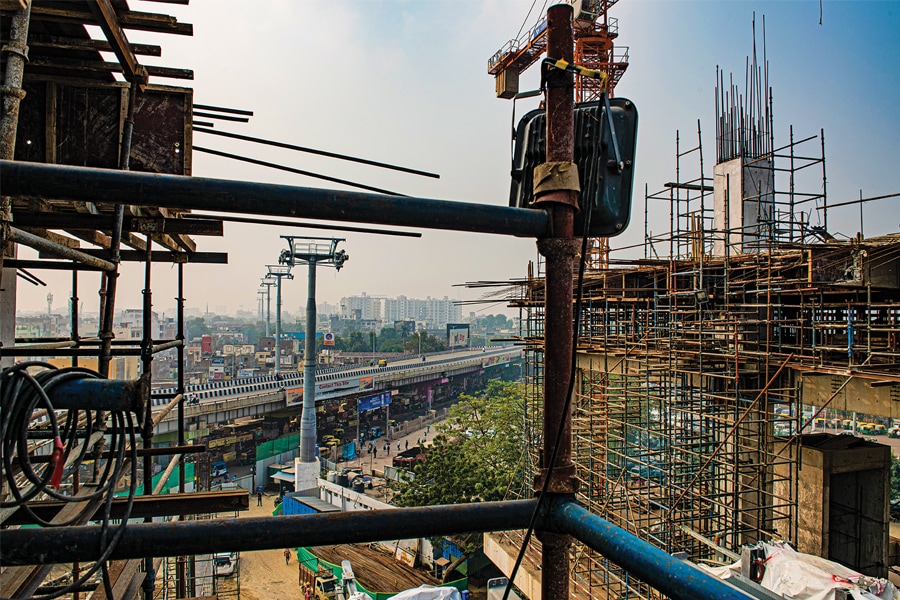
The construction site of Vishwa Samudra Group’s urban ropeway project in Varanasi that spans 3.85 km, with a passenger capacity of 96,000 per day
“With improved clarity regarding order-awarding activity from the roads ministry in August, project awarding is expected to gain momentum from September onwards," wrote Vinay Kumar, sector head of corporate ratings at ICRA, in a statement. “However, the overall project award will remain substantially lower than that of FY21-FY23 levels. Consequently, the growth momentum witnessed by road developers in recent years will moderate in the next 12 to 18 months."
This is also why the group is actively scaling up on its other infrastructure offerings in the country. It is building a greenfield port at Mulapeta in Andhra Pradesh for the state government, worth Rs3,000 crore. The project will see the construction of four berths.There is also the construction of five fishing harbours in Andhra Pradesh.
“We have not gone very aggressive with our bidding," says Shivdutt Das, executive director of Vishwa Samudra Holdings. “We could have gone on to bid for projects worth Rs50,000 crore. But we have been selective about what we do. If we look at our numbers compared to competitors, they would be operating with an Ebidta margin of 10 percent and PAT [profit after tax] of 4 percent. We have been at 15 percent Ebidta and 8 percent PAT." This year, the company is looking at a topline of Rs4,000 crore.

Roads and ports apart, the Vishwa Samudra Group is building depot infrastructures, an operational control centre, and an administrative building, for the Mumbai Metro in addition to an electrification project for the Uttar Pradesh government. The company had also relaid the runway for the Hyderabad airport, along with building the residential quarters for security personnel at the Goa airport.
Despite all this diversification in the domestic markets, it’s the global market that Sasidhar and Yendluri want a pie of, especially in Africa and Saudi Arabia, among others. “Our strategy is to go into areas where others either hesitate or take time," Yendluri says. “We want to be a modern new generation infra company going into all types of projects, not just roads or ports."
First Published: Nov 22, 2024, 11:37
Subscribe Now